实验3
实验任务1
window.hpp
#pragma once #include <iostream> #include <string> class Button { public: Button(const std::string& label_); const std::string& get_label() const; void click(); private: std::string label; }; Button::Button(const std::string& label_) : label{ label_ } { } inline const std::string& Button::get_label() const { return label; } inline void Button::click() { std::cout << "Button '" << label << "' clicked\n"; }
#include "window.hpp" #include <iostream> void test() { Window w("Demo"); w.add_button("add"); w.add_button("remove"); w.add_button("modify"); w.add_button("add"); w.display(); w.close(); } int main() { std::cout << "用组合类模拟简单GUI:\n"; test(); }
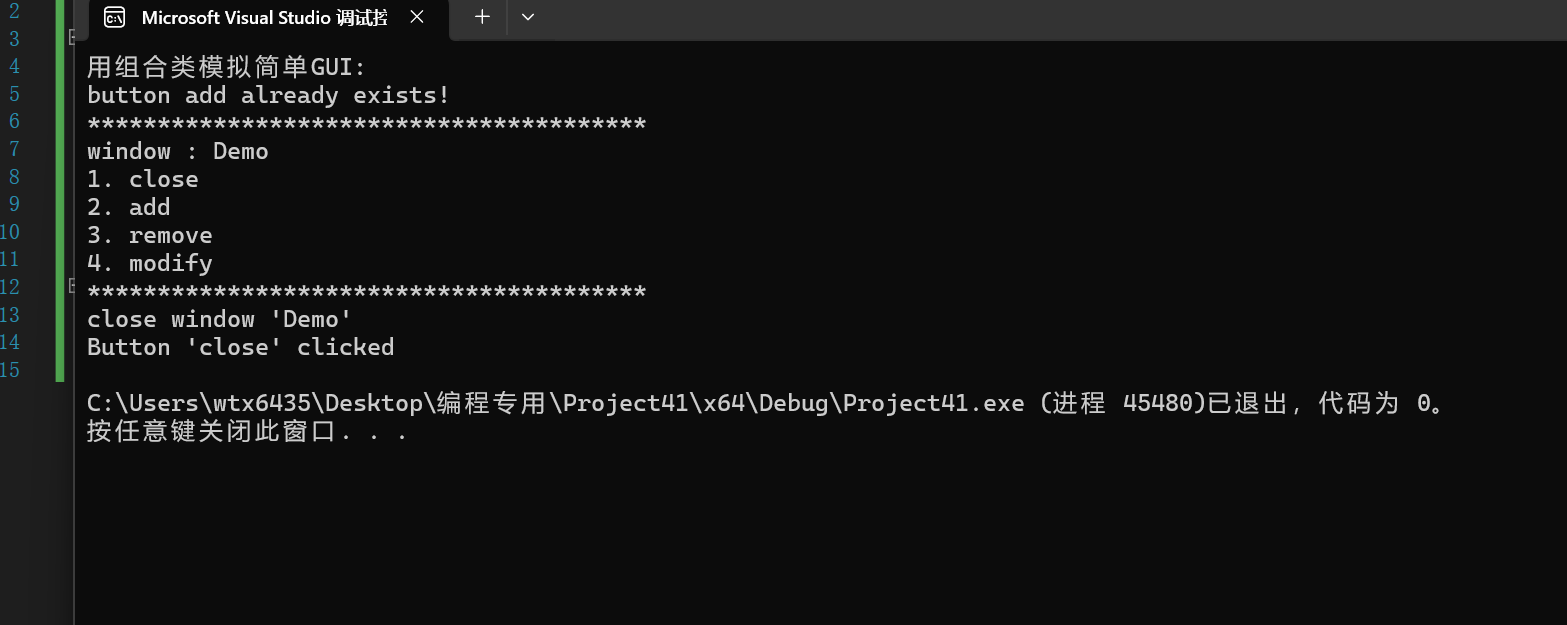
问题
1: 是组合关系
2:隐藏了实现细节,避免外部直接检查,保证内部约束
3:前者避免了拷贝,高效;后者生成临时对象,易引发悬垂引用,性能差。
4:均可正常运行,emplace_back更高效
实验任务2
task2:
#include <iostream> #include <vector> void test1(); void test2(); void output1(const std::vector<int>& v); void output2(const std::vector<int>& v); void output3(const std::vector<std::vector<int>>& v); int main() { std::cout << "深复制验证1: 标准库vector<int>\n"; test1(); std::cout << "\n深复制验证2: 标准库vector<int>嵌套使用\n"; test2(); } void test1() { std::vector<int> v1(5, 42); const std::vector<int> v2(v1); std::cout << "**********拷贝构造后**********\n"; std::cout << "v1: "; output1(v1); std::cout << "v2: "; output1(v2); v1.at(0) = -1; std::cout << "**********修改v1[0]后**********\n"; std::cout << "v1: "; output1(v1); std::cout << "v2: "; output1(v2); } void test2() { std::vector<std::vector<int>> v1{ {1, 2, 3}, {4, 5, 6, 7} }; const std::vector<std::vector<int>> v2(v1); std::cout << "**********拷贝构造后**********\n"; std::cout << "v1: "; output3(v1); std::cout << "v2: "; output3(v2); v1.at(0).push_back(-1); std::cout << "**********修改v1[0]后**********\n"; std::cout << "v1: \n"; output3(v1); std::cout << "v2: \n"; output3(v2); } // 使用xx.at()+循环输出vector<int>数据项 void output1(const std::vector<int>& v) { if (v.size() == 0) { std::cout << '\n'; return; } std::cout << v.at(0); for (auto i = 1; i < v.size(); ++i) std::cout << ", " << v.at(i); std::cout << '\n'; } // 使用迭代器+循环输出vector<int>数据项 void output2(const std::vector<int>& v) { if (v.size() == 0) { std::cout << '\n'; return; } auto it = v.begin(); std::cout << *it; for (it = v.begin() + 1; it != v.end(); ++it) std::cout << ", " << *it; std::cout << '\n'; } // 使用auto for分行输出vector<vector<int>>数据项 void output3(const std::vector<std::vector<int>>& v) { if (v.size() == 0) { std::cout << '\n'; return; } for (auto& i : v) output2(i); }
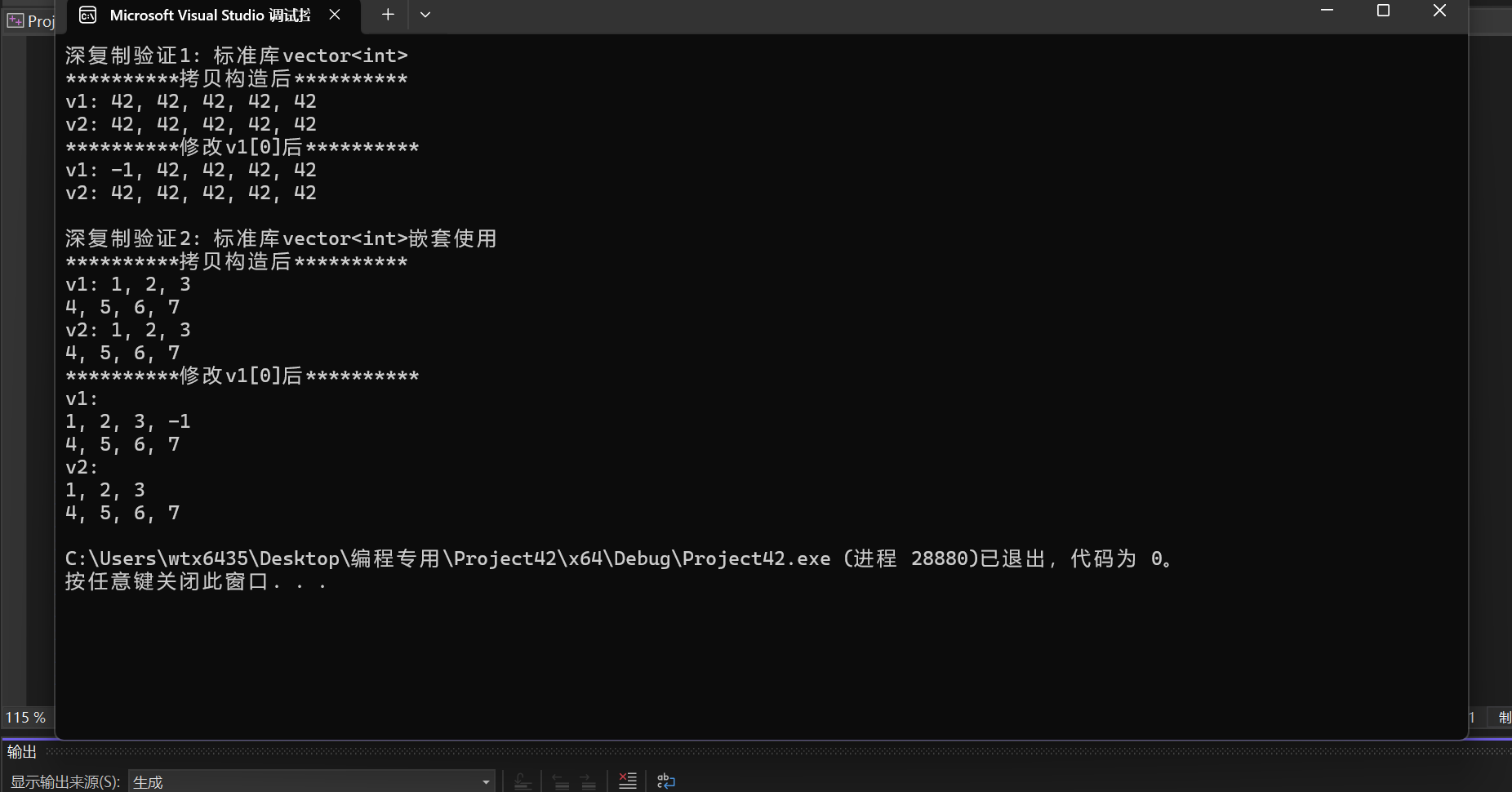
问题
1:V1和V2均含5个42
2:v1.size()==2,v2.size()==2,v1[0].size++3
3:at(0)与【0】效果相同,at带有边界检查
4:(1)
可以。
v1.at(0).push_back(-1); 已把 -1 放进 v1[0] 的末尾, r 是该 vector 的别名,因此 r.size()-1 对应下标即为 -1 ,能够正确输出。
(2)
优势:绑定到 at() 返回的 const vector<int>& ,避免拷贝,节省内存;同时禁止通过 r 修改容器,提高安全性。
限制:不能再通过 r 调用非 const 接口(如 push_back 、 clear 等),只能进行只读访问。
5:(1)
是深复制
(2)
是int&;是const int&。
必须提供
实验任务3
#pragma once #include <iostream> // 动态int数组对象类 class vectorInt { public: vectorInt(); vectorInt(int n_); vectorInt(int n_, int value); vectorInt(const vectorInt& vi); ~vectorInt(); int size() const; int& at(int index); const int& at(int index) const; vectorInt& assign(const vectorInt& vi); int* begin(); int* end(); const int* begin() const; const int* end() const; private: int n; // 当前数据项个数 int* ptr; // 数据区 }; vectorInt::vectorInt() :n{ 0 }, ptr{ nullptr } { } vectorInt::vectorInt(int n_) : n{ n_ }, ptr{ new int[n] } { } vectorInt::vectorInt(int n_, int value) : n{ n_ }, ptr{ new int[n_] } { for (auto i = 0; i < n; ++i) ptr[i] = value; } vectorInt::vectorInt(const vectorInt& vi) : n{ vi.n }, ptr{ new int[n] } { for (auto i = 0; i < n; ++i) ptr[i] = vi.ptr[i]; } vectorInt::~vectorInt() { delete[] ptr; } int vectorInt::size() const { return n; } const int& vectorInt::at(int index) const { if (index < 0 || index >= n) { std::cerr << "IndexError: index out of range\n"; std::exit(1); } return ptr[index]; } int& vectorInt::at(int index) { if (index < 0 || index >= n) { std::cerr << "IndexError: index out of range\n"; std::exit(1); } return ptr[index]; } vectorInt& vectorInt::assign(const vectorInt& vi) { if (this == &vi) return *this; int* ptr_tmp; ptr_tmp = new int[vi.n]; for (int i = 0; i < vi.n; ++i) ptr_tmp[i] = vi.ptr[i]; delete[] ptr; n = vi.n; ptr = ptr_tmp; return *this; } int* vectorInt::begin() { return ptr; } int* vectorInt::end() { return ptr + n; } const int* vectorInt::begin() const { return ptr; } const int* vectorInt::end() const { return ptr + n; }
task3.cpp
#include "vectorInt.hpp" #include <iostream> void test1(); void test2(); void output1(const vectorInt& vi); void output2(const vectorInt& vi); int main() { std::cout << "测试1: \n"; test1(); std::cout << "\n测试2: \n"; test2(); } void test1() { int n; std::cout << "Enter n: "; std::cin >> n; vectorInt x1(n); for (auto i = 0; i < n; ++i) x1.at(i) = (i + 1) * 10; std::cout << "x1: "; output1(x1); vectorInt x2(n, 42); vectorInt x3(x2); x2.at(0) = -1; std::cout << "x2: "; output1(x2); std::cout << "x3: "; output1(x3); } void test2() { const vectorInt x(5, 42); vectorInt y; y.assign(x); std::cout << "x: "; output2(x); std::cout << "y: "; output2(y); } // 使用xx.at()+循环输出vectorInt对象数据项 void output1(const vectorInt& vi) { if (vi.size() == 0) { std::cout << '\n'; return; } std::cout << vi.at(0); for (auto i = 1; i < vi.size(); ++i) std::cout << ", " << vi.at(i); std::cout << '\n'; } // 使用迭代器+循环输出vectorInt对象数据项 void output2(const vectorInt& vi) { if (vi.size() == 0) { std::cout << '\n'; return; } auto it = vi.begin(); std::cout << *it; for (it = vi.begin() + 1; it != vi.end(); ++it) std::cout << ", " << *it; std::cout << '\n'; }
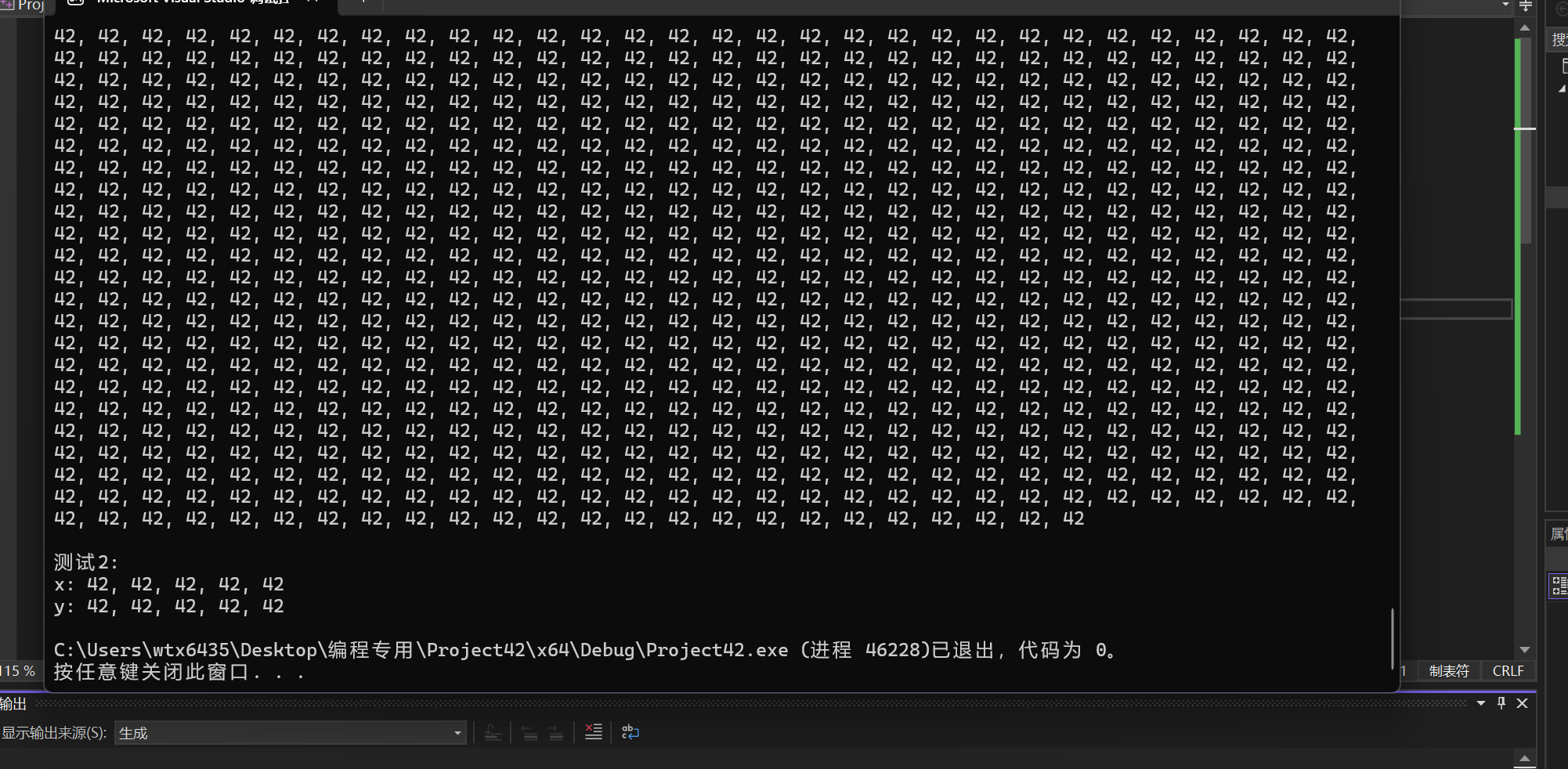
问题
1:
自赋值未判断:若 &vi == this ,① 会把自身内存先释放,后续 vi.ptr[i] 成悬空访问。
异常不安全:若 new int[n] 抛 std::bad_alloc ,则 ptr 已指向被释放的内存,对象进入不可恢复状态。
内存泄漏:当 vi.n > 原 n 且 new 失败时,原内存已被 delete[] ,却未回滚,导致后续析构时二次 delete[] 。
2:(1)
调用已存在的const重载版本,实现代码复用
(2)
转换前类型: const int& (const 版 at 的返回类型)
转换后类型: int&
目的:移除返回值的 const 限定,使非 const 对象也能获得可写引用,符合接口语义。
3:(1)
非const用于读写,const用于只读
(2)
vectorInt 直接返回原始指针作为迭代器,说明迭代器本质上是指针的薄封装。只要内存连续,原始指针即可满足迭代器概念,体现“零成本抽象”。
4:
可以改写
第一行把[ptr,ptr+n)全部置为value
第二行把vi的全部元素深复制到当前对象
第三行先复制到临时缓冲区,保障异常安全
实验任务4
#pragma once // 类Matrix声明 class Matrix { public: Matrix(int rows_, int cols_, double value = 0); // 构造rows_*cols_矩阵对象, 初值value Matrix(int rows_, double value = 0); // 构造rows_*rows_方阵对象, 初值value Matrix(const Matrix& x); // 深复制 ~Matrix(); void set(const double* pvalue, int size); // 按行复制pvalue指向的数据,要求size = rows * cols, 否则报错退出 void clear(); // 矩阵对象数据项置0 const double& at(int i, int j) const; // 返回矩阵对象索引(i,j)对应的数据项const引用(越界则报错后退出) double& at(int i, int j); // 返回矩阵对象索引(i,j)对应的数据项引用(越界则报错后退出) int rows() const; // 返回矩阵对象行数 int cols() const; // 返回矩阵对象列数 void print() const; // 按行打印数据 private: int n_rows; // 矩阵对象内元素行数 int n_cols; // 矩阵对象内元素列数 double* ptr; // 数据区 };
task4
#include <iostream> #include <cstdlib> #include "matrix.hpp" void test1(); void test2(); void output(const Matrix& m, int row_index); int main() { std::cout << "测试1: \n"; test1(); std::cout << "\n测试2: \n"; test2(); } void test1() { double x[1000] = { 1, 2, 3, 4, 5, 6, 7, 8, 9, 10 }; int n, m; std::cout << "Enter n and m: "; std::cin >> n >> m; Matrix m1(n, m); // 创建矩阵对象m1, 大小n×m m1.set(x, n * m); // 用一维数组x的值按行为矩阵m1赋值 Matrix m2(m, n); // 创建矩阵对象m2, 大小m×n m2.set(x, m * n); // 用一维数组x的值按行为矩阵m1赋值 Matrix m3(n); // 创建一个n×n方阵对象 m3.set(x, n * n); // 用一维数组x的值按行为矩阵m3赋值 std::cout << "矩阵对象m1: \n"; m1.print(); std::cout << "矩阵对象m2: \n"; m2.print(); std::cout << "矩阵对象m3: \n"; m3.print(); } void test2() { Matrix m1(2, 3, -1); const Matrix m2(m1); std::cout << "矩阵对象m1: \n"; m1.print(); std::cout << "矩阵对象m2: \n"; m2.print(); m1.clear(); m1.at(0, 0) = 1; std::cout << "m1更新后: \n"; std::cout << "矩阵对象m1第0行 "; output(m1, 0); std::cout << "矩阵对象m2第0行: "; output(m2, 0); } // 输出矩阵对象row_index行所有元素 void output(const Matrix& m, int row_index) { if (row_index < 0 || row_index > m.rows()) { std::cerr << "IndexError: row index out of range\n"; std::exit(1); } std::cout << m.at(row_index, 0); for (int j = 1; j < m.cols(); ++j) std::cout << ", " << m.at(row_index, j); std::cout << '\n'; }
#include "matrix.hpp" #include <iostream> #include <cstdlib> #include <algorithm> Matrix::Matrix(int rows_, int cols_, double value) : n_rows(rows_), n_cols(cols_), ptr(new double[rows_ * cols_]) { std::fill_n(ptr, n_rows * n_cols, value); } Matrix::Matrix(int rows_, double value) : Matrix(rows_, rows_, value) {} Matrix::Matrix(const Matrix& x) : n_rows(x.n_rows), n_cols(x.n_cols), ptr(new double[n_rows * n_cols]) { std::copy_n(x.ptr, n_rows * n_cols, ptr); } Matrix::~Matrix() { delete[] ptr; } void Matrix::set(const double* pvalue, int size) { if (size != n_rows * n_cols) { std::cerr << "Size mismatch in set()\n"; std::exit(1); } std::copy_n(pvalue, size, ptr); } void Matrix::clear() { std::fill_n(ptr, n_rows * n_cols, 0.0); } const double& Matrix::at(int i, int j) const { if (i < 0 || i >= n_rows || j < 0 || j >= n_cols) { std::cerr << "IndexError: matrix subscript out of bounds\n"; std::exit(1); } return ptr[i * n_cols + j]; } double& Matrix::at(int i, int j) { if (i < 0 || i >= n_rows || j < 0 || j >= n_cols) { std::cerr << "IndexError: matrix subscript out of bounds\n"; std::exit(1); } return ptr[i * n_cols + j]; } int Matrix::rows() const { return n_rows; } int Matrix::cols() const { return n_cols; } void Matrix::print() const { for (int i = 0; i < n_rows; ++i) { for (int j = 0; j < n_cols; ++j) { std::cout << ptr[i * n_cols + j]; if (j + 1 < n_cols) std::cout << ", "; } std::cout << "\n"; } }
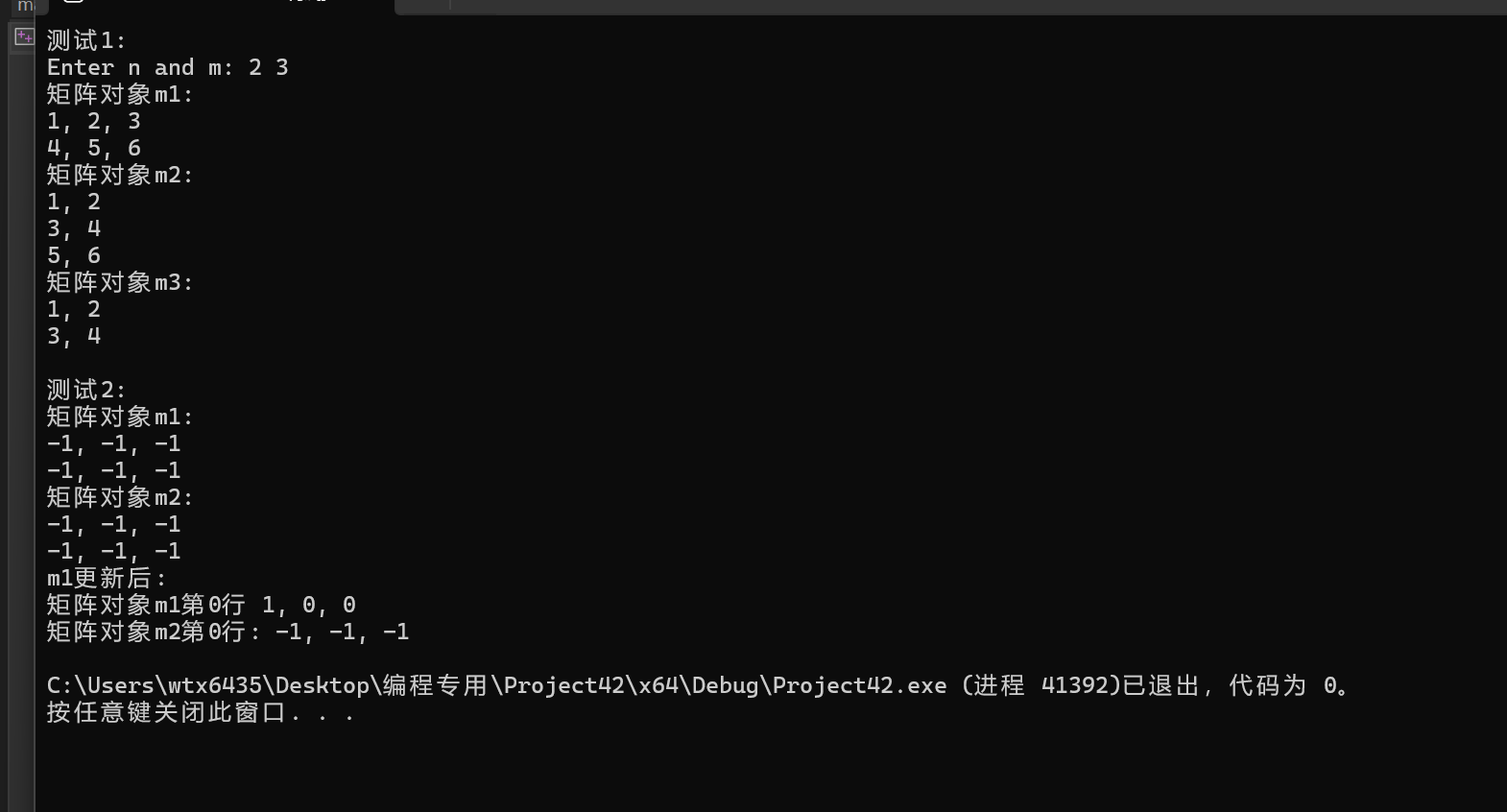
实验任务5
#pragma once #include <iostream> #include <string> // 联系人类 class Contact { public: Contact(const std::string& name_, const std::string& phone_); const std::string& get_name() const; const std::string& get_phone() const; void display() const; private: std::string name; // 必填项 std::string phone; // 必填项 }; Contact::Contact(const std::string& name_, const std::string& phone_) :name{ name_ }, phone{ phone_ } { } const std::string& Contact::get_name() const { return name; } const std::string& Contact::get_phone() const { return phone; } void Contact::display() const { std::cout << name << ", " << phone; }
# pragma once #include <iostream> #include <string> #include <vector> #include <algorithm> #include "contact.hpp" // 通讯录类 class ContactBook { public: void add(const std::string& name, const std::string& phone); // 添加联系人 void remove(const std::string& name); // 移除联系人 void find(const std::string& name) const; // 查找联系人 void display() const; // 显示所有联系人 size_t size() const; private: int index(const std::string& name) const { for (size_t i = 0; i < contacts.size(); ++i) { if (contacts[i].get_name() == name) { return static_cast<int>(i); } } return -1; } void sort() { std::sort(contacts.begin(), contacts.end(), [](const Contact& a, const Contact& b) { return a.get_name() < b.get_name(); }); } private: std::vector<Contact> contacts; }; void ContactBook::add(const std::string& name, const std::string& phone) { if (index(name) == -1) { contacts.push_back(Contact(name, phone)); std::cout << name << " add successfully.\n"; sort(); return; } std::cout << name << " already exists. fail to add!\n"; } void ContactBook::remove(const std::string& name) { int i = index(name); if (i == -1) { std::cout << name << " not found, fail to remove!\n"; return; } contacts.erase(contacts.begin() + i); std::cout << name << " remove successfully.\n"; } void ContactBook::find(const std::string& name) const { int i = index(name); if (i == -1) { std::cout << name << " not found!\n"; return; } contacts[i].display(); std::cout << '\n'; } void ContactBook::display() const { for (auto& c : contacts) { c.display(); std::cout << '\n'; } } size_t ContactBook::size() const { return contacts.size(); }
task5
#include "contactBook.hpp" void test() { ContactBook contactbook; std::cout << "1. add contacts\n"; contactbook.add("Bob", "18199357253"); contactbook.add("Alice", "17300886371"); contactbook.add("Linda", "18184538072"); contactbook.add("Alice", "17300886371"); std::cout << "\n2. display contacts\n"; std::cout << "There are " << contactbook.size() << " contacts.\n"; contactbook.display(); std::cout << "\n3. find contacts\n"; contactbook.find("Bob"); contactbook.find("David"); std::cout << "\n4. remove contact\n"; contactbook.remove("Bob"); contactbook.remove("David"); } int main() { test(); }
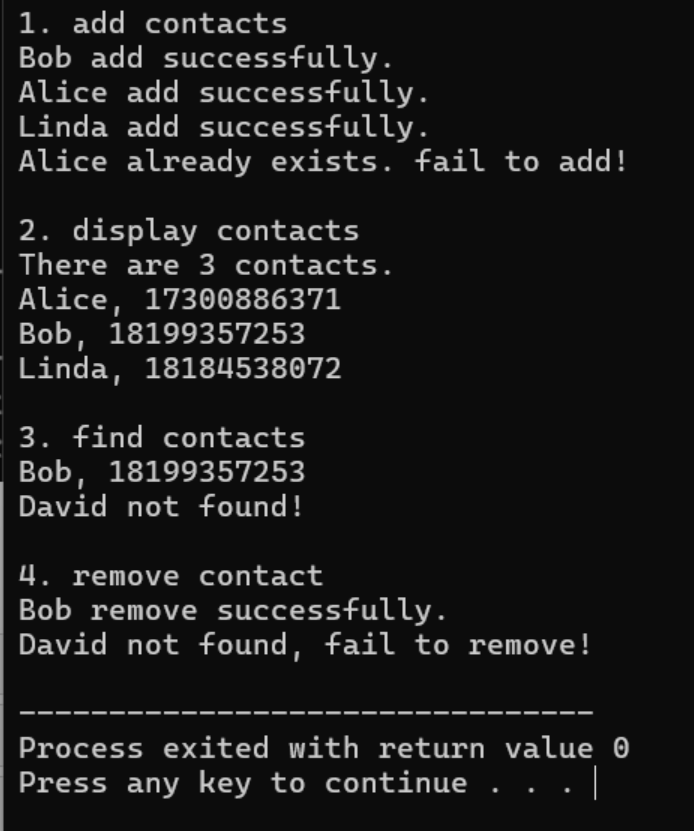


 浙公网安备 33010602011771号
浙公网安备 33010602011771号